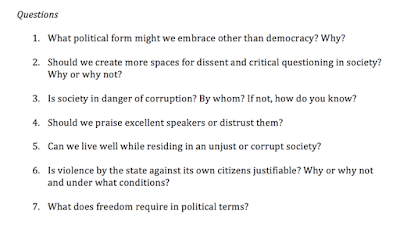The History of Political Thought: Looking Back at the Year
This year I had the great pleasure of teaching a sequence of courses in the history of political thought: “Ancient and Early Modern Political Philosophy” in the fall and “Modern Political Philosophy” this spring. Even better, nine students took both courses, creating a terrific group of youthful political philosophers dedicated to the “big questions” of political philosophy and conversant with writers from Herodotus to Frantz Fanon. I still have my doubts about the adequacy of the canon, but I had a little faith restored this year. Witnessing how students not only responded to these great books but took them up with vitality and excitement reminded me why such courses exist. Contemporary writers such as Charles Taylor or Shulamith Firestone simply mean more when one has worked through Marx. The student of ancient political philosophy’s politeia can discern the fallaciousness of the liberal-communitarian debate as it’s typically posed. A serious reader of the Stoics sees anarchism ...
